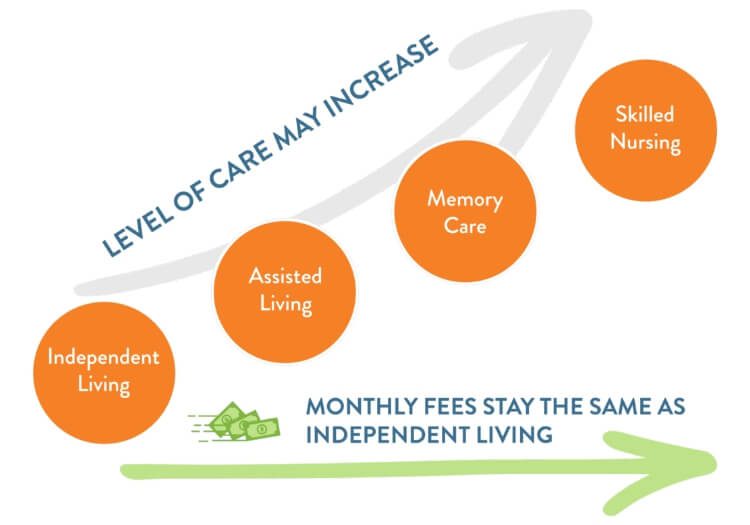As you explore senior living options, you’ll encounter many different terms—independent living, assisted living, memory care, skilled nursing, retirement communities, CCRCs, and Life Plan Communities. Understanding the differences is the first step in deciding where you want to live and how you want to plan for your future.
At Heron’s Key in Gig Harbor, WA, we’re proud to be one of only four Type A Life Care Communities in Western Washington, offering not only a vibrant lifestyle but also true peace of mind.

What Is a Life Plan Community?
A Life Plan Community—also known as a Continuing Care Retirement Community (CCRC)—provides a full continuum of care on one campus. At Heron’s Key, that means:
- Independent Living with resort-style amenities and maintenance-free living.
- Assisted Living for residents who benefit from daily support.
- Memory Care for those living with Alzheimer’s disease or other forms of dementia.
- Skilled Nursing and Rehabilitation at Penrose Harbor, located right within our community
By choosing Heron’s Key, you enjoy the freedom and wellness opportunities of independent living while also having the assurance that, should your health needs change, advanced care is available—without leaving the community you already call home.
Differences Between Life Care Communities

Learn more about our floor plan offerings
Call our team at (877) 892-7129 or join us on a campus visit.

Why Choose a Life Plan Community Like Heron’s Key?
Life Plan Communities stand out because they combine lifestyle and long-term security. Benefits include:
- Peace of Mind for the Future: Priority access to all levels of care without the stress of another move.
- Predictable Costs: With our Type A Life Care contract, monthly fees remain stable even if your care needs increase.
- Engaged Lifestyle: From over 40 resident-led committees to lifelong learning, hiking groups, and social outings, there’s always something to do.
- Maintenance-Free Living: Say goodbye to home repairs, yardwork, and property taxes.
- Exceptional Dining: Fresh, locally sourced meals with flexible pay-as-you-go dining options.
- Welcoming Community: Build new friendships with peers who share your interests and values.
- Pet-Friendly Campus: Bring your four-legged friends—they’re part of our family too.

The Heron’s Key Advantage
While many senior living communities offer only one type of care, Heron’s Key is different. As a Life Care Community, we provide:
- Financial Security: Protect yourself from the rising costs of senior care
- Long-Term Savings: Lock in today’s rates for future care
- Guaranteed Access: Even if your financial resources change, you’ll continue to receive the care you need
- Flexibility: Couples can remain in the same community, even if one spouse requires a higher level of care
This unique combination of lifestyle, security, and savings makes Heron’s Key one of the best retirement living options in the Pacific Northwest.
Plan Your Future With Confidence
Moving to a Life Plan Community like Heron’s Key isn’t just about today—it’s about planning wisely for tomorrow. Many seniors are surprised to find that living here can be more cost-effective than staying in their own homes, once expenses such as property taxes, maintenance, utilities, and insurance are factored in. By securing your future now, you and your family can relax knowing you’ll always have access to the right care in a trusted environment.



At Heron’s Key, you’re not just choosing a home—you’re choosing peace of mind, financial predictability, and a vibrant lifestyle on the scenic shores of Gig Harbor. If you live in the area or you’re planning to visit, we’d be happy to show you around and answer your questions. Contact us to set up a time.





